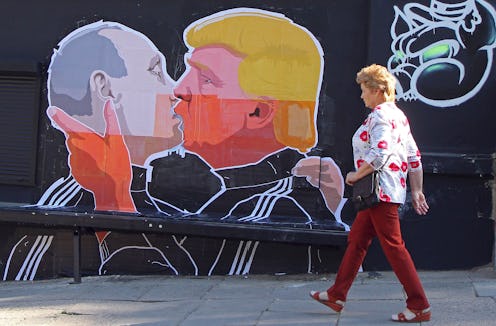News
Russia Could Have Played A Role In Wikileaks
Donald Trump has repeatedly tried to deny close ties with Russia, but his alleged relationship with the country seems to be becoming more clear than ever following his election to the presidency. In one of the most bizarre aspects of the 2016 election — and trust me, there are plenty to choose from — voters saw the former Republican nominee reap the benefits of Russia's alleged hacks against the Democratic National Committee, whose information was then handed over to WikiLeaks. And now the election's over, one Russian political analyst has implied Russia helped elect Trump through the use of WikiLeaks.
Not one to keep his alleged friend waiting, Russian President Vladimir Putin was among the first to congratulate Trump on his surprising (devastating, horrifying) win via telegram (because apparently Trump actually kicked us back a full 100 years this week).
According to The Guardian, Putin remarked on the current state of American-Russian relations, saying: "We understand that it will not be an easy path given the current state of degradation in the relations. And as I have repeatedly said, it’s not our fault that Russian-American relations are in such a poor state." Yet, he expressed hope in a stronger future for the countries: "But Russia wants and is ready to restore fully fledged relations with the United States."
Putin's warm tone with Trump reflected much of the speculation surrounding the Republican's alleged ties with the country, despite Trump's claim that he "knows nothing about Russia." But it was Sergei Markov, a pro-Kremlin political analyst, that has seemed to seal the deal. Though he denied outright claims of Russian interference in the election, Markov had something revealing to say about the DNC hacks: "maybe we helped a bit with WikiLeaks."
For his part, Putin has previously denied having any influence over the US election, with the Russian president calling the claims "nonsense."
The response from Markov seems cheeky, but its implications still remain. The fact that WikiLeaks, by a Russian analyst's own admission, could have had such a significant impact on the election is now a devastating reality when faced with Trump's presidency. As Vox put it, the WikiLeaks information dumps largely only served to misinform, leaving the American public confused as to what was malicious and what was merely the regular activities of a presidential campaign.
WikiLeaks claims that its information defended "the public's right to be informed," but in reality, it may have simply handed Trump the presidency. In that way, WikiLeaks doesn't necessarily represent a great defense of freedom to information. Instead, Russia's alleged involvement with WikiLeaks highlights an American democracy that left its election open to foreign exploitation.
